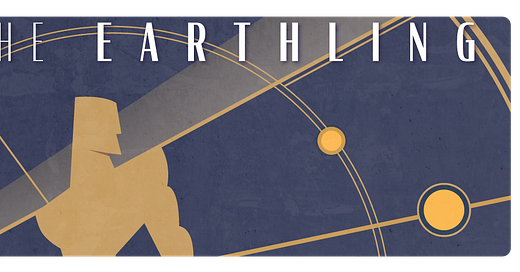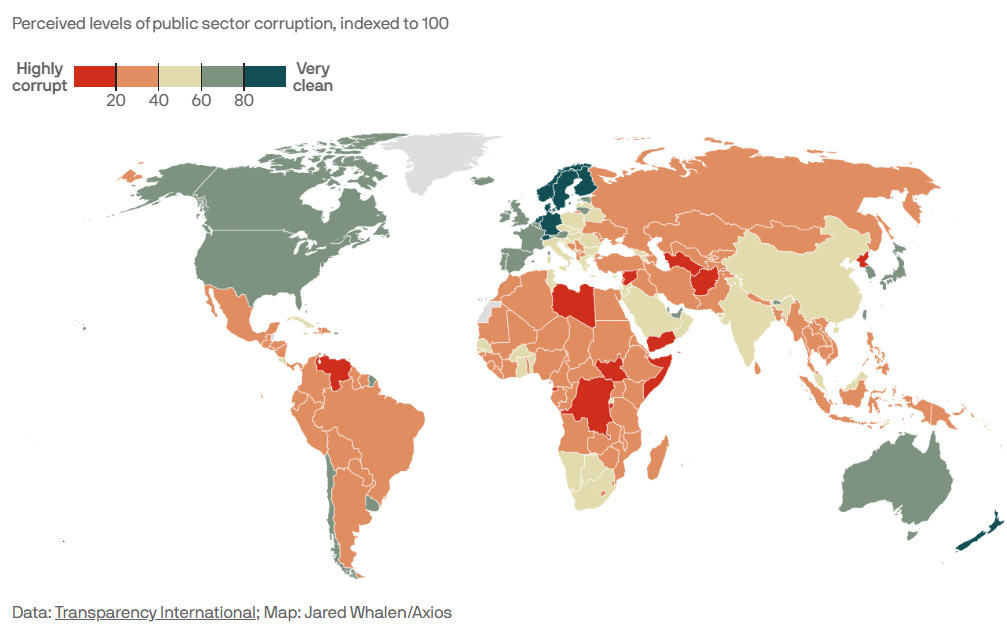The Earthling: Musk vs. moon, Good times for arms makers, Eating animals guiltlessly...
Plus: Global corruption map, WHO and WTO reform, What matters in Ukraine, China's Fight Club, etc.
A wayward rocket launched by Elon Musk’s SpaceX in 2015 will crash into the moon on March 4th at a velocity of 5,800 miles per hour, according to space observers. It will be the first known case of a lunar landing accomplished by space junk. The rocket succeeded seven years ago in depositing its payload, a satellite, in space—but then, lacking the energy to return to Earth, surrendered to lunar gravitational forces. Sadly, the 9,000-pound vessel will collide with the far side of the moon, beyond the view of earthlings.
Every year Transparency International asks “experts and businesspeople” to rate the corruptness of countries and turns the results into a Corruption Perception Index. This year’s trophy for cleanest-seeming country is shared by Denmark, Finland, and New Zealand. The US finished 27th (down from 25th the previous year), China 66th, India 85th, Brazil 96th, Ukraine 120th, and Russia 136th. The bottom ten countries—171st through 180th—include a disproportionate number that have endured either US sanctions (Venezuela, North Korea) or US or US-backed military intervention (Libya, Afghanistan, Syria, Yemen, Somalia). Of course, correlation doesn’t establish causality (much less establish the direction of causality), but the correlation is strong enough to be worth noting.
At the outset of the Covid pandemic, there were complaints that the World Health Organization was tailoring its messaging to please China, one of its biggest donors. But now a proposal to make the WHO less reliant on voluntary donations—and hence presumably more independent—is running into resistance from the United States, Reuters reports. The proposed reforms, which would increase member states’ mandated annual contributions, are supported by most nations. But the US—which, like China, is a big donor to UN agencies and has been accused of unduly influencing their policies—backs an alternative plan that would create a separate, donor-controlled fund to deal with global health emergencies.
In Responsible Statecraft, Eli Clifton observes that seven out of eight authors of a new think tank report advocating weapons sales are in the business of… selling weapons (in some cases indirectly, by consulting for arms makers). The report was released by the Jewish Institute for National Security of America, a hawkish, pro-Israel think tank that supports US military assistance for Israel’s Arab allies. In a second piece, Clifton looks at recent quarterly earnings calls with executives at arms manufacturers to see how international conflict helps their bottom line. Which leads to:
Military Industrial Complex quote of the week:
[W]e are seeing, I would say, opportunities for international sales. We just have to look to last week where we saw the drone attack in the UAE… And of course, the tensions in Eastern Europe, the tensions in the South China Sea, all of those things are putting pressure on some of the defense spending over there. So I fully expect we're going to see some benefit from it. I would say, though, that should there be hostilities, whether it's in the Middle East or whether it's in the Asia-Pacific region you're not going to see an immediate benefit here because what you'll see is a reallocation of inventory that we already have out there…
—Greg Hayes, CEO of Raytheon, on a quarterly earnings call.
“If you care about animals, you should eat them.” So argues philosopher Nick Zangwill in Aeon. Most farm animals wouldn’t exist if we didn’t breed them for eventual consumption, Zangwill reasons, so they have meat eaters to thank for the gift of life. Zangwill opposes factory farming, since the life it offers animals is not worth living, and he says his argument doesn’t apply to pigs, since they’re uniquely intelligent among farm animals. But when it comes to cows, sheep, and chickens, then—so long as they’re raised in decent conditions—“we may proceed directly to the dinner table.” Whatever you think of this, um, provocative argument, it raises a question: If you want to eat meat and dairy products and minimize the suffering that entails, how do you know which brands to buy? Last month a Vox piece complained about “humanewashing”—the use of vague, misleadingly reassuring labels (like “ethically raised”) on meat and dairy products. Here’s an environmental NGO’s interactive site that may help you separate the humanewashing from the humane. Just pick a kind of meat and scroll down to see what the different labeling designations mean. Here, for example, is the meaning of “Food Alliance Certified-Grassfed” on a package of beef:





